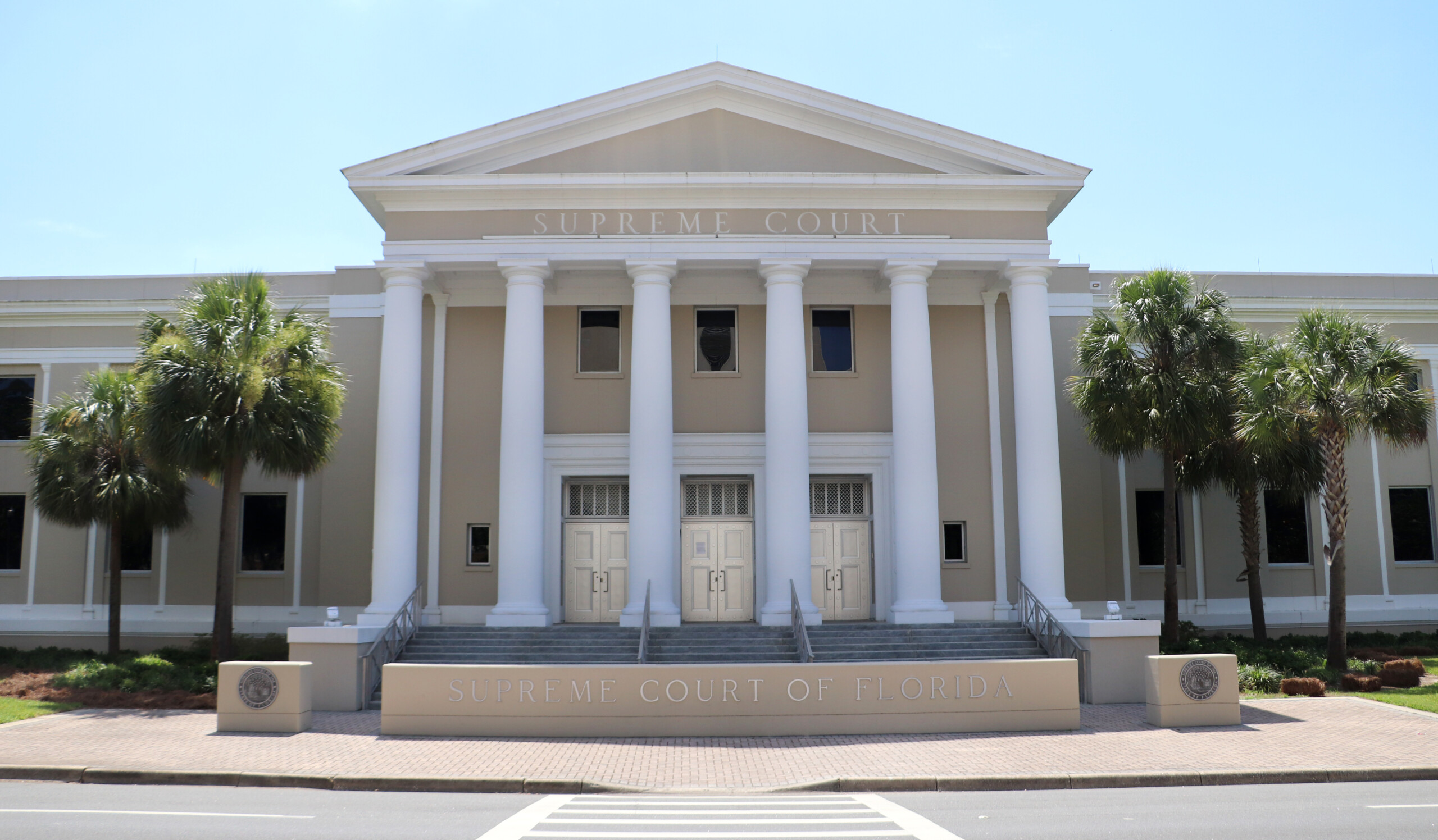Gov. Ron DeSantis’ administration is urging the state Supreme Court to uphold the constitutionality of a congressional redistricting plan that DeSantis pushed through the Legislature in 2022, saying it properly prevented a racially gerrymandered North Florida district.
Attorneys for the state argued in a 76-page brief that the Supreme Court should reject voting rights groups’ arguments that the plan violated part of the state Constitution. The case centers on North Florida’s Congressional District 5, which in the past elected Black Democrat Al Lawson but was overhauled in 2022 — with a white Republican subsequently getting elected.
The state’s brief said the 2022 plan declined to “perpetuate” a gerrymander that in the past stretched District 5 from Jacksonville to Gadsden County, west of Tallahassee, picking up sizable numbers of Black voters. The revamped district is in the Jacksonville area.
“Petitioners (the voting rights groups and other plaintiffs) would see race reign supreme in Florida’s redistricting efforts,” attorneys for the state wrote. “The Florida Constitution does not compel that result, and the U.S. Constitution would not permit it anyway.”
The plaintiffs, such as the League of Women Voters of Florida and Equal Ground Education Fund, went to the Supreme Court in December after the 1st District Court of Appeal upheld the redistricting plan. They argue that the plan violates a 2010 state constitutional amendment that prohibited drawing districts that would “diminish” the ability of minorities to “elect representatives of their choice.”
“This is a straightforward case that calls for a straightforward application of this (Florida Supreme) Court’s precedent,” the plaintiffs’ attorneys argued in a Feb. 28 brief. “There is no dispute that Florida’s enacted plan diminishes the voting power of Black Floridians in North Florida. There is no dispute that under this (Supreme) Court’s prior precedent that diminishment violates the Florida Constitution.”
DeSantis in 2022 vetoed a congressional redistricting plan passed by the Republican-controlled Legislature and muscled through a replacement that included revamping District 5. DeSantis argued that keeping a district similar to the past District 5 would be an unconstitutional racial gerrymander under the U.S. Constitution’s Equal Protection Clause.
The plaintiffs filed a lawsuit in Leon County circuit court, contending that the plan violated what is known as the “non-diminishment” clause of the 2010 constitutional amendment. Circuit Judge J. Lee Marsh agreed with the plaintiffs, but the 1st District Court of Appeal rejected that decision in December, citing the sprawling shape of the district that elected Lawson.
The appeals court’s main opinion said protection offered under the non-diminishment clause of the state Constitution and under the federal Voting Rights Act “is of the voting power of ‘a politically cohesive, geographically insular minority group.’” It said linking voters across a large stretch of North Florida did not meet such a definition of cohesiveness.
The brief Monday was filed on behalf of Secretary of State Cord Byrd, one of the named defendants in the case. The Legislature also is a defendant and was given an extension until May 6 to file its brief at the Supreme Court.
Monday’s brief backed the appeals court’s position on the sprawling nature of the former Congressional District 5. The state’s attorneys wrote that the plaintiffs “failed to prove that Black voters in Benchmark CD-5 (the former Lawson-held district) comprised the type of ‘geographically compact community’ protected by the non-diminishment clause.”
The brief also focused on equal-protection arguments as it attacked the possibility of a racial gerrymander.
“Because petitioners’ non-diminishment theory would compel the state to perpetuate a grotesque racial gerrymander — Benchmark CD-5 — petitioners must show the gerrymander is narrowly tailored to meet a compelling interest,” the brief said. “The only interest they cite is compliance with Florida’s non-diminishment clause. But compliance with state law cannot justify denying equal protection to thousands of Florida voters.”
In their February brief, however, attorneys for the plaintiffs cited Florida Supreme Court decisions in 2015 that led to the district that elected Lawson. The brief said the “Florida Constitution expressly prohibits redistricting plans that diminish minority voters’ ability to elect representatives of their choice.”
“The facts in this case are undisputed,” attorneys for the plaintiffs wrote. “Black voters in North Florida had the ability to elect their candidates of choice under the prior redistricting plan, and the enacted (2022) plan eliminates that ability. Under this (Supreme) Court’s unambiguous legal standard and the stipulated facts, petitioners proved a textbook violation of the non-diminishment provision.”
The Supreme Court said in January that it would take up the case but has not scheduled arguments. With a candidate-qualifying period held last week for congressional races, the disputed map will be used in this fall’s elections.
A federal court on March 27 rejected a separate challenge to the redistricting plan. Plaintiffs last week asked the court to reconsider the decision, which involves federal constitutional issues.
9(MDEwNzczMDA2MDEzNTg3ODA1MTAzZjYxNg004))







